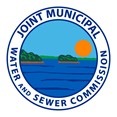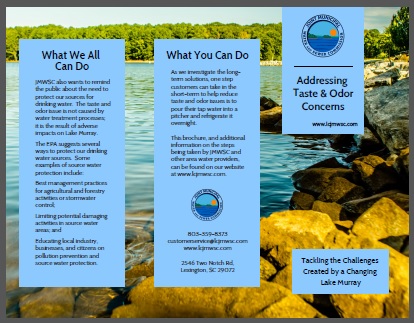


Area Water Providers Detail Actions Being Taken to Address Taste and Odor Issues
West Columbia, Lexington, and Joint Municipal Water & Sewer Commission Working Together to Determine Best Long-term Solution;
Collaborating with University of South Carolina and South Carolina DHEC on Water Quality, Soil Analyses;
Aesthetic Issues Returning Earlier than Expected This Year
WEST COLUMBIA & LEXINGTON, SC, April 27, 2020: Because of rising temperatures, heavier rainfalls, and changes to the runoff entering Lake Murray in recent years, algal blooms in the lake are impacting our region’s main source of water with greater frequency, causing unpleasant changes to the taste and odor of the finished drinking water. There are no safety concerns related to these taste and odor events. Today, the area’s water providers – The City of West Columbia, the Town of Lexington, and the Joint Municipal Water and Sewer Commission (JMWSC) – announced a series of steps they are taking to address taste and odor issues.
While the drinking water can be aesthetically unpleasing during these algal blooms, the water is safe to drink. All of the area’s water providers are also operating significant water quality monitoring programs to ensure federal and state water quality standards are always met. In the meantime, one step customers can take to help reduce taste and odor issues is to pour their tap water into a pitcher and refrigerate it overnight.
Taste and odor impacts were expected to reoccur later this year. However, water providers already receiving reports of higher-than-normal geosmin levels in Lake Murray’s water. Geosmin is an organic compound often produced by algal blooms that leads to taste and odor impacts; the word “geosmin” literally translates to “earthy smell”. While every attempt will be made to lessen taste and odor issues using water treatment processes, there are limits to what water providers can do to eliminate the issue at this time.
To arrive at the correct long-term solution for the problem, West Columbia, Lexington, and JMWSC are studying and testing a variety of treatment strategies. We are all collaborating with the University of South Carolina and the South Carolina Department of Health and Environmental Control (SCDHEC) to share water quality and soil sample analyses from Lake Murray, as well as online temperature measurements. West Columbia is also moving forward with a preliminary engineering report to assist in their evaluation of their additional treatment technologies, which will include an enhanced capability to address the issue.
In addition to this release, the area’s water providers will use social media, and print and Web content to detail the taste and odor issue and the efforts being taken to combat the problem.
Taste & Odor Brochure
